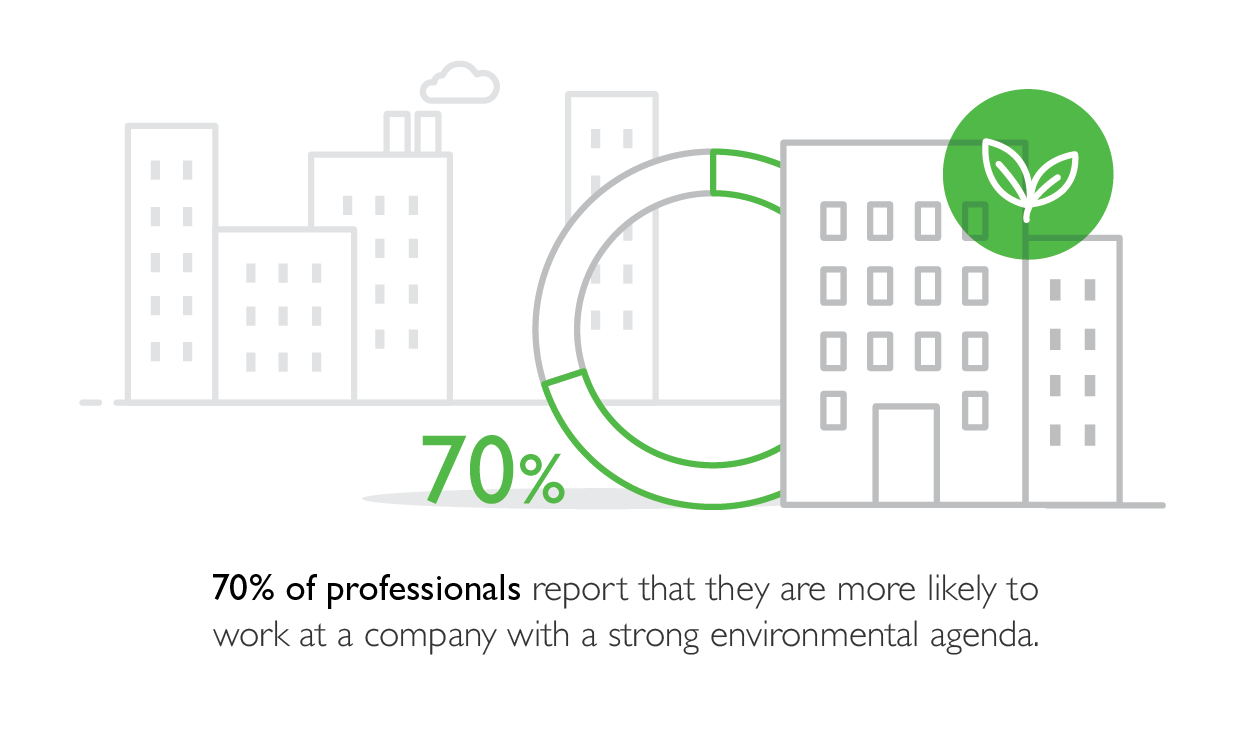It turns out green business is good business.
According to a comprehensive Nielsen report covering three different industries, consumer products that have sustainability claims experienced higher rates of sales growth relative to other products in the market. In other words, consumers appear to be drawn to green goods. This means businesses that can substantiate their sustainability claims may have a marketing edge.
And it’s not just consumer markets that benefit from sustainability. Running a business is a fiscal balancing act, and often, sustainable business practices can help decision-makers scale back overhead. Businesses that espouse the virtues of sustainability may also put themselves at an advantage as they vie for talent. According to Fast Company, nearly 70% of survey respondents said they would be more likely to work at a company with a strong environmental agenda.
Tax incentives are another good reason to go green. According to the NIST, businesses that employ sustainable practices may qualify for state and federal tax benefits in the form of rebates and incentives.
Not to mention, there’s the gratification in knowing you’re combating waste within your organization, creating an example for the community and helping to encourage sustainability within society.

Some simple but effective starting points
Rest assured, you don’t have to run out and install solar panels just yet. There are plenty of exceptionally simple ways to save money on extraneous resources while reducing your environmental impact. Let’s look at just a few of them:
Go paperless
This option is simple and incredibly convenient. Online banking, bill pay, payroll, vendor payment and digital cash management make it easier than ever for businesses to save on postage, printer ink, envelopes and paper. You can also offer customers paperless receipts via email, and use ACH for paperless accounts receivables and payables.
Set up motion-sensor lighting
Energy usage is a sizeable source of overhead, especially if you leave the lights on when no one’s around. Smarter lighting can help cut back on the amount of waste within your organization.
Use energy-efficient equipment
From installing energy-saving LED bulbs to making power efficiency a priority when purchasing machinery, keep sustainability in mind when investing in business resources. The energy savings can ultimately translate to a lower total cost of ownership. To go the extra mile, consider working with sustainable vendors.
Ditch water bottles and disposable cups
Constantly replenishing your supply of paper cups and water bottles adds up in your business bank account and in the landfill. A one-time investment in reusable drinking vessels and a water filtration system can save money and waste in the long term.
Reduce, reuse, recycle
Avoid printing things when you don’t have to, and try to print double-sided if you do. Bring spent printer cartridges to your local office supplies store, or donate them to a nonprofit organization like Evolve Recycling. Drop your old computer hardware off at Best Buy and they’ll recycle it for you. Instead of disposable batteries, use rechargeable ones. Switching to rechargeable batteries will cost you more up front but save money and pay for themselves after 2 to 3 years of use according to Clark Howard. And while you’re at it, distribute recycle bins and educate employees about what they can and cannot recycle.
Create a telecommuting policy
COVID-19 rapidly advanced the practice of working remotely for many businesses. In addition to giving your employees a much sought-after business perk, allowing telecommuting a few times a week post-pandemic can cut back on energy usage while reducing the overall amount of fuel workers use to commute to work.
Donate leftovers (if you’re in food service)
The Bill Emerson Good Samaritan Act protects restaurants from liability tied to food donations, and the 2015 Protecting Americans from Tax Hikes (PATH) Act entitles some donors to tax deductions. So don’t hesitate to donate your leftovers to a nonprofit that will put them to good use rather than just throwing them in the dumpster to attract raccoons.
It’s all comes down to saving money
Every business is technically a sustainable business – or at least it has to be to succeed.
Every dollar you save counts, and if practicing sustainability in the workplace lets you pinch pennies while helping the environment, more power to you and your company.
